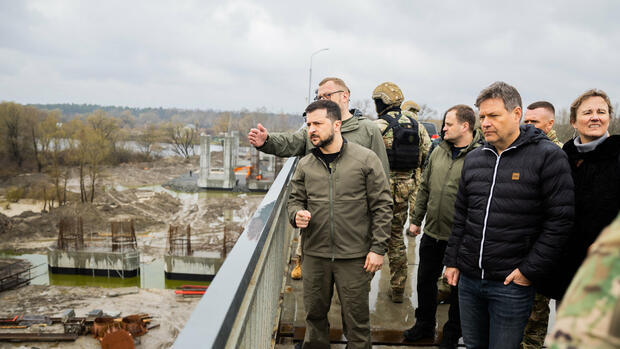Berlin, Riga Robert Habeck had only just arrived in Ukraine when he made one thing clear: the Federal Minister of Economics did not just come to express his sympathy.
The purpose of the trip is to send a clear signal to Ukraine, said Habeck. A sign “that we believe that it will be victorious, that it will be rebuilt, that there is an interest in Europe not only to provide support in times of need, but that Ukraine will also be an economically strong partner in the future “.
The selection of his companions also shows: Habeck is concerned with reconstruction, the country’s economic future and certainly also with the Ukraine as a market for German companies. The Green politician, who met Ukrainian President Volodymyr Zelenskiy among others on Monday, will be accompanied by a delegation of German business leaders on the trip, which was carried out under high security conditions.
Habeck travels to Ukraine for the first time since the beginning of the Russian war of aggression. The minister said he only wanted to come if he could bring something with him: “A business delegation that gives Ukraine hope that there will be reconstruction after the war.”
An end to the war between Ukraine and Russia is still not in sight. At the same time, the Eastern European country is concerned about its economic future. The damage caused by war is immense, and it continues to increase with each day of battle. For Ukraine as well as for Western leaders, one thing is clear: reconstruction can only succeed with international support.
In addition, Ukraine is facing the challenges of economic transformation towards climate-friendly technologies, even if that has receded into the background.
Last summer, the Ukrainian government calculated that potential donors wanted to generate annual GDP growth of more than seven percent by 2032 – while emitting 65 percent less CO2 than in 1990. Consequently Kiev repeatedly argues with international partners that the support will be worthwhile.
Habeck wants to expand energy partnership with Ukraine
Germany and Ukraine have been partners on energy issues since 2020. After visiting a substation of the energy company “Ukrenergo”, which supplies one of the most densely populated areas of Ukraine with energy, Habeck announced on Monday morning that the energy partnership would be deepened.
The Federal Minister of Economics, together with Volodimir Kudrytski, CEO of the energy company Ukrenergo, visits a substation that was hit by Russian rockets.
(Photo: dpa)
Since the Russian invasion of Ukraine in February last year, the focus has been on emergency aid to repair and maintain the power grid. But the energy partnership between the two countries should result in more, Habeck makes clear.
“The wish and the strategic plans – and these are security plans of the Ukrainians – are actually to make the energy system broader and more decentralized,” he said. This is also an “invitation to decarbonize”, i.e. to say goodbye to fossil fuels.
“In this respect, two things fit together quite well: the need for security and a sustainable energy system.” The Ukraine could become an energy exporter to Europe, the minister explained.
Enormous costs of reconstruction of Ukraine in many areas
The challenges of recovery go beyond energy issues. Construction, transport and municipal infrastructure are other acute issues, explained Martin Wansleben, General Manager of the German Chamber of Industry and Commerce (DIHK), on Monday. Wansleben is part of the delegation accompanying Habeck.
>> Read more: Germany launches reconstruction platform for Ukraine
Wansleben assured the Ukraine that German business would support the country’s reconstruction. “The trip with Federal Minister of Economics Habeck is a signal and an offer from German industry to help shape the reconstruction of Ukraine together with the Ukrainians,” he told the Handelsblatt.
Despite the Russian war of aggression, many German companies are still active in Ukraine. “That can be a good basis when it comes to supporting the reconstruction of Ukraine, which has already begun,” explained Wansleben.
The tasks are enormous. Estimates of the cost of reconstruction differ, but they are united by the enormous dimensions. According to the latest survey by the World Bank, the Ukrainian government, the EU Commission and the United Nations, published in the second Rapid Damage and Needs Assessment, at least US$411 billion is needed to manage reconstruction.
The Federal Minister of Economics traveled from Poland to Ukraine by train, accompanied by a business delegation.
(Photo: dpa)
In July 2022, the Ukrainian Prime Minister Denys Schmyhal estimated the country’s needs at around 720 billion euros. At the time, the head of the European Investment Bank, Werner Hoyer, even assumed costs of more than one trillion dollars for international donors.
Let Russia pay for the reconstruction of Ukraine?
In the short and medium term, however, the focus in Ukraine is on next winter. Jaco Cilliers, representative of the United Nations Development Program (UNDP) in Ukraine, estimates the immediate need at around $2.1 billion. According to Cilliers, in addition to power supply, critical social infrastructure is at stake, including heating, drinking water, wastewater treatment and the safety of high-voltage transformers.
>> Read more: Many states do not oppose Russia – that gives them power and autonomy
In addition to international endeavors, many countries are already contributing bilaterally to reconstruction. Only at the end of last week did the Japanese government announce that it would subsidize the reconstruction of Ukraine with 400 million dollars. The money will be used to restore critical infrastructure.
But there is another alternative when it comes to financing the reconstruction. Demands are repeatedly made to let Russia, as the polluter state, pay directly for the reconstruction. As recently as February, the Baltic states and Poland had called on other Western governments to use Russia’s central bank reserves, which are stored abroad, for this purpose – after all, almost $300 billion. But critics see potential violations of international law in such an approach.
More: Development economist explains who is helping Moscow – “Russia’s economy is safe from sanctions”
